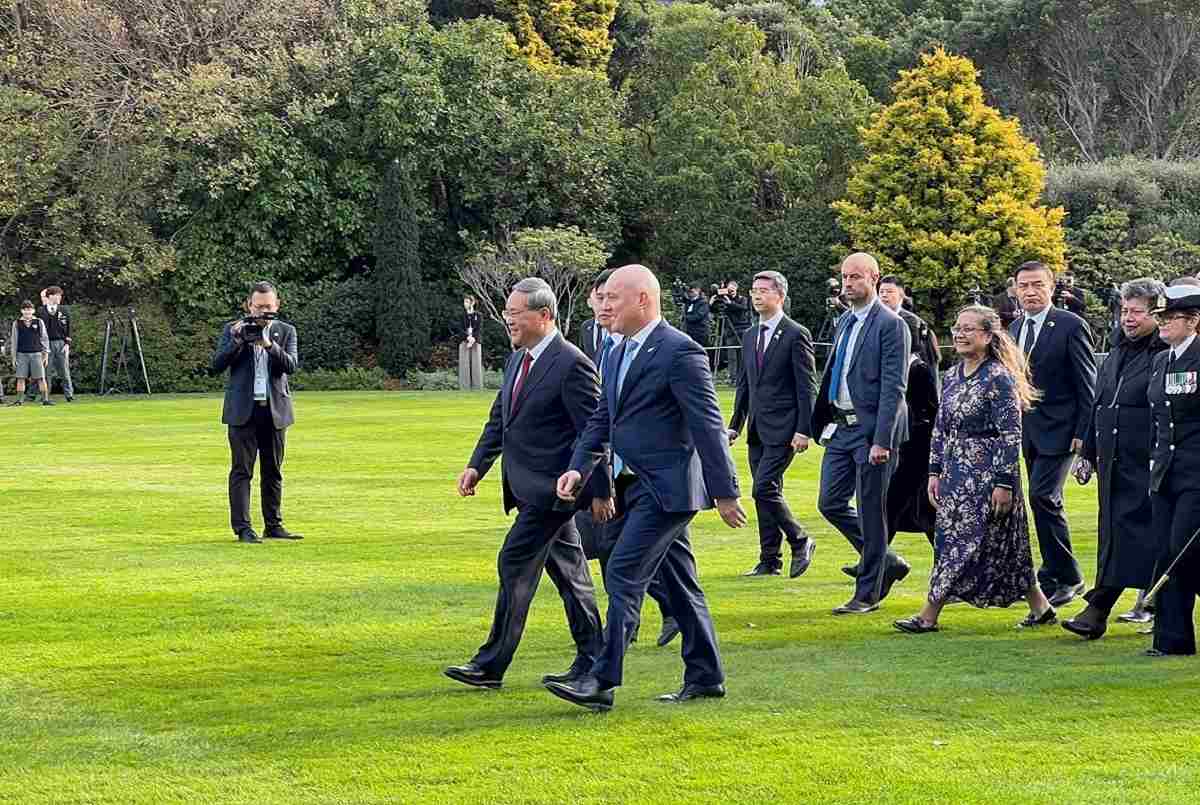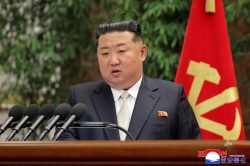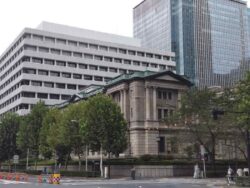
New Zealand Prime Minister Christopher Luxon and Governor General Cindy Kiro welcome Chinese Premier Li Qiang with a traditional Maori welcome and honour guard, during Li Qiang’s visit to New Zealand, on the grounds of the official residence of the Governor-General, in Wellington, New Zealand June 13, 2024.
17:31 JST, June 13, 2024
WELLINGTON, June 13 (Reuters) – New Zealand and China on Thursday signed agreements on trade and climate change, with human rights also on the agenda, during a trip by Premier Li Qiang, the highest level Chinese visit to New Zealand in seven years.
New Zealand Prime Minister Christopher Luxon is seeking to balance rights and security concerns with the lucrative trade opportunities offered by Beijing, the country’s largest export partner.
“The Premier and I discussed our significant economic relationship, which benefits people in both countries with two-way trade in goods worth nearly NZ$38 billion ($23.43 billion),” Luxon said.
Li was greeted on the lawns of Government House in the capital Wellington by both Luxon and the governor-general and participated in a traditional Indigenous Maori welcome before heading inside for meetings.
“We agreed that it is important to expand cooperation on trade and investment,” Li said following the meeting.
“China is ready to be part of New Zealand’s endeavor to double the value of exports in next decade.”
China will extend visa-free travel to New Zealanders, while New Zealand will support Chinese language teaching and cultural exchanges though its Confucius Institutes in the country, Li added.
TOUGHENED STANCE
Previously a more moderate voice on China, New Zealand’s relationship with China has changed since the last time a Chinese premier visited in 2017.
New Zealand has toughened its stance this year, calling out Beijing for hacking the country’s parliament and noting the growing threat China poses to security in the Pacific.
“I raised with Premier Li a number of issues that are important to New Zealanders and which speak to our core values, including human rights and foreign interference,” Luxon said in a statement.
“New Zealand will continue to engage predictably and consistently with China, including on issues where we disagree,” Luxon said.
Luxon said other issues discussed included the disputed South China Sea, where China has become increasingly assertive, China’s bid to join the Comprehensive and Progressive Agreement for Trans-Pacific Partnership trade bloc and the AUKUS security alliance.
New Zealand, however, has largely avoided trade disputes with Beijing that have until recently impacted neighboring Australia, where Li heads next in a trip aimed at boosting China’s standing in the region.
Chinese-New Zealanders gathered at a central city hotel to greet the premier, holding banners supporting China’s relationship with New Zealand and waving Chinese flags and beating drums. Others held banners protesting China’s treatment of its citizens.
“I’m just very excited to be here,” said Ling Wang, who had traveled two hours from city Palmerston North to greet the premier, having made the same trip in 2017 when Premier Li Keqiang visited.
($1 = 1.6218 New Zealand dollars)
Top Articles in News Services
-

Survey Shows False Election Info Perceived as True
-

Hong Kong Ex-Publisher Jimmy Lai’s Sentence Raises International Outcry as China Defends It
-

Japan’s Nikkei Stock Average Touches 58,000 as Yen, Jgbs Rally on Election Fallout (UPDATE 1)
-

Japan’s Nikkei Stock Average Falls as US-Iran Tensions Unsettle Investors (UPDATE 1)
-

Japan’s Nikkei Stock Average Rises on Tech Rally and Takaichi’s Spending Hopes (UPDATE 1)
JN ACCESS RANKING
-

Producer Behind Pop Group XG Arrested for Cocaine Possession
-

Japan PM Takaichi’s Cabinet Resigns en Masse
-

Man Infected with Measles Reportedly Dined at Restaurant in Tokyo Station
-

Israeli Ambassador to Japan Speaks about Japan’s Role in the Reconstruction of Gaza
-

Videos Plagiarized, Reposted with False Subtitles Claiming ‘Ryukyu Belongs to China’; Anti-China False Information Also Posted in Japan


























